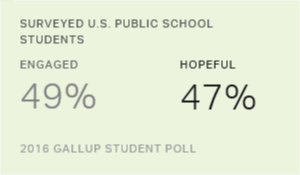By definition, having privilege is seen as an advantage in life. Privilege comes in many forms ranging from what family situation or race you were born into to how much money you make to even where you got your college degree. And at a time when the U.S. is experiencing societal unrest, it would be easy to remain convinced that privilege still reigns supreme.
But when it comes to college graduates who end up achieving the gold standard in life of thriving in all aspects of well-being, as defined by Gallup and Healthways -- purpose, social, financial, community and physical -- a powerful new understanding is emerging.
If you were asked to predict which of the following two distinct groups of college graduates has the greatest likelihood of succeeding in all aspects of life, how would you answer?
Group 1: Those who are minority, first-generation college graduates and who graduated from public colleges and universities.
Group 2: Those who are white (non-Hispanic), whose mothers and fathers both completed college (mother's education is often used as a proxy for socioeconomic status) and who graduated from private colleges and universities.
It turns out that graduates from the first group are just as likely to end up thriving in all aspects of well-being later in life as graduates from the second group.
We've been led to believe that students who have parents who completed college, who come from a higher socioeconomic background, who attend a private college or university and who are white have an advantage over those whose parents don't have a degree, come from a lower socioeconomic class, attend a public university and are minority. But when Gallup compares college graduates on the opposite ends of these supposed advantages and relative disadvantages, it's not exactly the result most would anticipate.
This finding comes from the Gallup-Purdue Index (now Gallup Alumni Survey), a representative study of nearly 30,000 college graduates with Internet access in the U.S. In addition to asking about household income, profession and many other aspects of their lives, Gallup was most interested in understanding the degree to which graduates were achieving their American Dream of a "great job" and a "great life." Uniquely suited to measure and analyze this in the form of decades-long research on workplace engagement and well-being, Gallup has uncovered a number of counterintuitive findings. Perhaps none are more compelling than this one: First-generation, minority graduates from public universities are just as likely to make the grade on a "great life" after college as graduates whose parents completed college, are white and attended private colleges or universities.
There is a lot to say about this finding, and it raises a lot of new questions. In our society, it's still true that those who have privilege in various forms end up with many benefits in life. But what if those advantages -- like getting a degree from a private college or coming from a higher socioeconomic background -- don't necessarily lead to thriving in life overall? What if there are paths to success that we haven't paid close attention to? What if privilege is a relative disadvantage?
Many researchers and writers in the education field have been buzzing in the past decade about measures of "grit" and "hope" and "resilience" as strong predictors of success in school and life. Gallup has studied a number of these elements in schools. Hopeful students, for example, are more likely to score better on tests, have higher grades and graduate.
What if the college graduates who had to struggle more than others end up more successful in the long-run? Perhaps the struggle itself instilled grit, hope and resilience. Or it's possible that the grit, hope and resilience come from the student's belief that college is a precious opportunity and one that is not to be squandered. It is well known that graduation rates for first-generation, minority students are much lower than for others -- so, to some degree, we may also be looking at the very best who make it to graduation.
Gallup research is getting closer to answering many of these questions. What we do know is that regardless of minority status, socioeconomic class and first-generation college student status, how you take advantage of college is more important than where you go. For example, graduates who had mentoring relationships, internships and jobs where they applied their learning, as well as long-term projects lasting more than a semester, doubled their odds of being engaged in work and thriving in their well-being later in life. It may be the case that those who value college most take more advantage of the opportunity.
There is much more research left to do, but this new evidence provides an immediate and compellingly different view of the path to a great life. It's safe to say that the path is not what we thought it was. For all those would-be first-generation, minority college students who can't afford a private education, there is a very hopeful path forward. Our nation's challenge, of course, is that too few of these students ever make it to college in the first place. And institutions struggle greatly to improve the graduation rates of those who do enroll. But for those who manage to graduate -- they have the same odds of achieving a "great life." And that should motivate us all.


